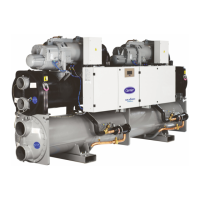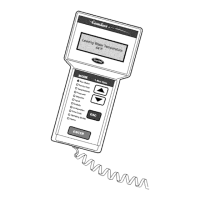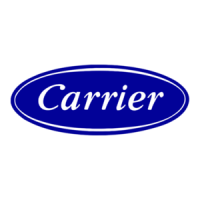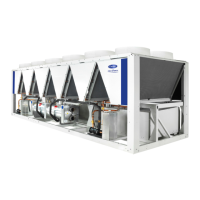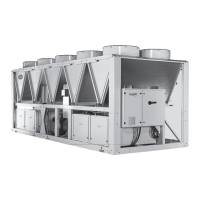8
• Inspect the unit for damage or missing parts. If damage
is detected, or if shipment is incomplete, immediately
le a claim with the shipping company.
• Conrm that the unit received is the one ordered.
Compare the name plate data with the order.
• The unit name plate must include the following
information:
- Version number
- Model number
- CE marking
- Serial number
- Year of manufacture and test date
- Fluid being transported
- Refrigerant used and refrigerant class
- Refrigerant charge per circuit
- Containment uid to be used
- PS: Min./max. allowable pressure (high and low
pressure side)
- TS: Min./max. allowable temperature (high and
low pressure side)
- Pressure switch cut-out pressures
- Unit leak test pressure
- Voltage, frequency, number of phases
- Maximum current drawn
- Maximum power input
- Unit net weight
• Conrm that all accessories ordered for on-site
installation have been delivered, and are complete
and undamaged.
The unit must be checked periodically during its whole
operating life to ensure that no shocks (handling accessories,
tools etc.) have damaged it. If necessary, the damaged parts
must be repaired or replaced. See also chapter 13 “Standard
maintenance”.
Do not attempt to remove refrigerant circuit components
or ttings, while the machine is under pressure or while it
is running. Be sure pressure is at 0 kPa before removing
components or opening a circuit.
Do not attempt to repair or recondition any safety devices
when corrosion or build-up of foreign material (rust, dirt,
scale, etc.) is found within the valve body or mechanism.
If necessary, replace the device. Do not install relief valves
in series or backwards.
ATTENTION: No part of the unit must be used as a
walk-way, rack or support. Periodically check and repair
or if necessary replace any component or piping that
shows signs of damage.
The refrigerant lines can break under the weight and
release refrigerant, causing personal injury.
Do not climb on a machine. Use a platform, or staging to
work at higher levels.
Use mechanical lifting equipment (crane, hoist, winch, etc.)
to lift or move heavy components. For lighter components,
use lifting equipment when there is a risk of slipping or
losing your balance.
Use only original replacement parts for any repair or
com-ponent replacement. Consult the list of replacement
parts that corresponds to the specication of the original
equip-ment.
Do not drain water circuits containing industrial brines,
without informing the technical service department at the
installation site or a competent body rst.
Close the entering and leaving water shutoff valves and
purge the unit water circuit, before working on the compo-
nents installed on the circuit (screen lter, pump, water
ow switch, etc.).
Do not loosen the water box bolts until the water boxes
have been completely drained.
Periodically inspect all valves, ttings and pipes of the
refrigerant and hydraulic circuits to ensure that they do
not show any corrosion or any signs of leaks.
It is recommended to wear ear defenders, when working
near the unit and the unit is in operation.
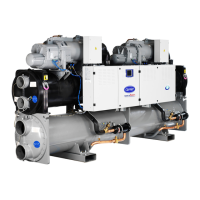
